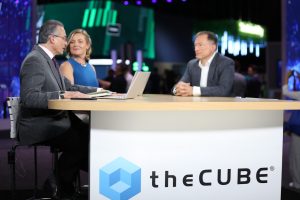 AI
AI
 AI
AI
 AI
AI
Dell Technologies Inc. made a series of announcements at its major conference in Las Vegas yesterday that positioned it as the go-to vendor for on-premises artificial intelligence development.
Behind these latest releases can be found an acknowledgement of how rapidly AI has progressed in barely a year’s time.
“The level of understanding of the AI ecosystem and what is possible has gone up dramatically,” said John Roese (pictured), global chief technology officer of products and operations at Dell. “We’ve evolved to understand you have tools like retrieval augmented generation, you have different model choices, you have the ability to manage the system in a different way. We all know an AI will be intrinsically slightly flawed or error prone, but we’ve gotten beyond that being a reason not to do it. Now we’re building systems that accommodate the strengths and weaknesses of them.”
Roese spoke with theCUBE’s Dave Vellante and Savannah Peterson at Dell Technologies World, during an exclusive broadcast on theCUBE, SiliconANGLE Media’s livestreaming studio. They discussed how quantum and other innovations will lead to further advancement for AI. (* Disclosure below.)
Building systems to accommodate AI will require advances in existing technologies, and Dell has identified quantum computing as one of the factors in future AI deployment. In Dell’s “Top Tech Predictions of 2024,” the company forecast that there would be a push for architectural innovation to support a range of workloads, including quantum computing chips.

Dell Technologies’ John Roese discusses the AI future with theCUBE at Dell Technologies World.
“It is inevitable that a probabilistic computer, i.e., a quantum system, would be incredibly valuable to a probabilistic system like a generative AI environment,” Roese explained. “There’s a lot of people, including myself, that think one of the big breakthroughs on quantum in the early days might not necessarily be inferencing or low-level stuff. It might be that it just revolutionizes training. That will have a profound impact in the building of foundation models.”
There is also a scenario in which advances in AI could move quantum along more rapidly, Roese added.
“In fact, the early breakthroughs are in that direction,” he said. “It turns out AI is really good at helping you build more effective higher performance control systems and things that can manage a magnetic field. So, some of the really hard physical problems in quantum will actually only be solvable by the application of AI and that’s happening.”
Dell is also turning its attention to AI agents, intelligent software that can collect data and perform tasks. AI agents for protecting personally identifiable information, autonomously documenting and building data integrations, and providing proscriptive help are already in the IT marketplace.
“The next phase, which we’re starting to talk about, is this concept of agents,” Roese said. “You’re not building one big monolith, you’re building instances of an AI agent that you have a virtual IT ops person, a virtual marketing person. And each one is self-contained. The question is which one wins at the end, the giant engine or the army of agents?”
Here’s the complete video interview, part of SiliconANGLE’s and theCUBE Research’s coverage of Dell Technologies World:
(* Disclosure: Dell Technologies Inc. sponsored this segment of theCUBE. Neither Dell nor other sponsors have editorial control over content on theCUBE or SiliconANGLE.)
THANK YOU